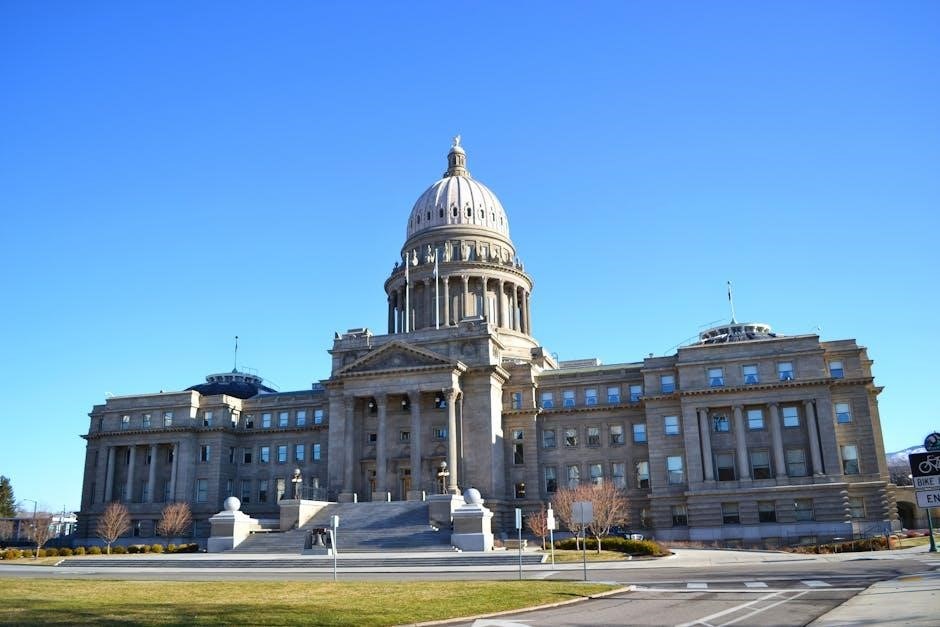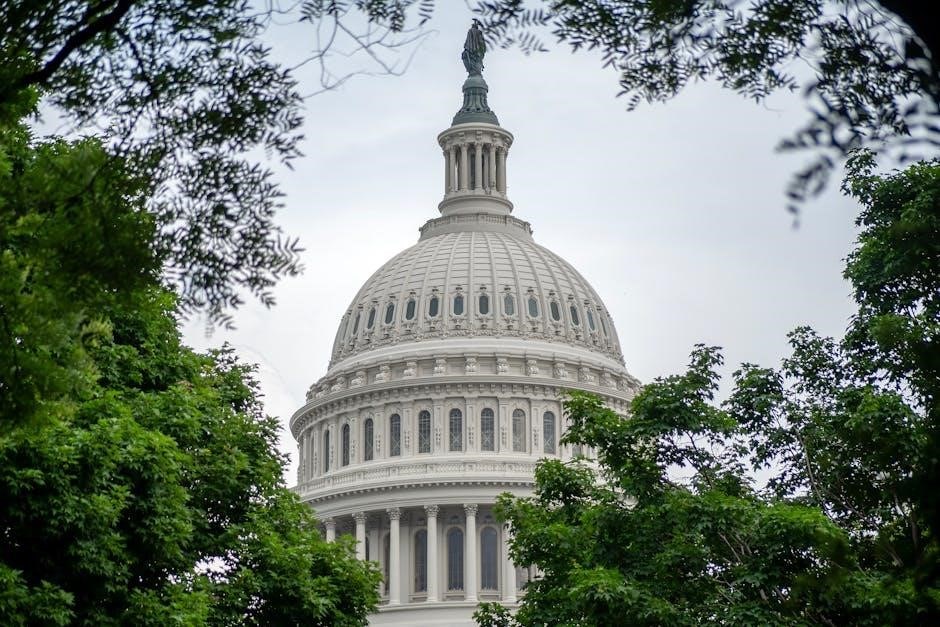origins of american government guided reading activity
Summary
Explore the fascinating history and key principles that shaped the American government. Discover how it all began!

The origins of American government are deeply rooted in colonial practices and Enlightenment ideas, shaping foundational principles like separation of powers and representative government, influencing modern governance.
1.1 Overview of the Guided Reading Activity
The guided reading activity on the origins of American government is designed to help students understand the foundational principles and historical context that shaped the U.S. political system. It begins with an introduction to key concepts such as natural law, popular sovereignty, and the influence of Enlightenment thinkers like John Locke. The activity is divided into sections, each focusing on specific topics, including colonial practices, landmark English documents, and the events leading to the American Revolution. Students engage with multiple-choice questions, true/false statements, and concept maps to reinforce their understanding. Additionally, the activity includes a worksheet for identifying events that led to the Revolution, ensuring a comprehensive exploration of the subject matter.
1.2 Importance of Understanding the Foundations
Understanding the origins of American government is essential for grasping the principles that shaped the U.S. political system. These foundational concepts, such as separation of powers, representative government, and natural rights, continue to influence modern governance. By exploring historical documents like the Magna Carta and the Declaration of Independence, students gain insight into the development of democratic ideals. This knowledge helps citizens analyze contemporary issues, evaluate policies, and participate meaningfully in civic life. It also fosters an appreciation for the challenges and compromises that led to the creation of the Constitution and Bill of Rights, ensuring a well-rounded understanding of American governance and its enduring legacy.

Early Influences on American Government
The early American government was influenced by colonial charters, the Mayflower Compact, and English documents like the Magna Carta, introducing ideas of self-governance and limited government authority.
2.1 The Mayflower Compact
The Mayflower Compact, signed in 1620, was the first major self-government document in America. It established a framework for governance in Plymouth Colony, ensuring the settlers could create laws and maintain order. This compact was a significant step toward representative government, as it required consent from the governed. The document also emphasized equality among participants, with all male settlers signing it. Its principles laid the groundwork for future colonial charters and influenced the development of American democratic ideals. The Mayflower Compact demonstrated the Pilgrims’ commitment to self-rule and collective decision-making, setting a precedent for later American governance structures.
2.2 The Virginia House of Burgesses
The Virginia House of Burgesses, established in 1619, was the first legislative assembly in the American colonies. It served as part of the Virginia General Assembly, with representatives elected by free male colonists. This body introduced the concept of representative government, allowing colonists to voice their concerns and participate in decision-making. The House of Burgesses played a pivotal role in shaping colonial governance, addressing local issues, and setting precedents for self-rule. Its influence extended beyond colonial times, contributing to the development of democratic principles in the United States. The Burgess system emphasized the consent of the governed and laid the groundwork for future political structures in America.

Key Documents Shaping American Government
The Magna Carta, English Bill of Rights, and Declaration of Independence are foundational documents that established principles of liberty, rule of law, and sovereignty, shaping American governance.
3.1 The Magna Carta
The Magna Carta, signed in 1215 by King John of England, was a pivotal document limiting the monarch’s power and establishing key principles of liberty and justice. It introduced the concept of rule of law, ensuring that even the king was not above the law. This document protected the rights of nobles and laid the groundwork for constitutional government. Its influence extended to the American colonies, shaping ideas of due process, protection of rights, and limitations on governmental authority. The Magna Carta’s legacy is evident in the U.S. Constitution and Bill of Rights, as it emphasized the importance of checks on power and the protection of individual freedoms, becoming a cornerstone of American governance.
3.2 The English Bill of Rights
The English Bill of Rights, enacted in 1689, was a significant document that limited the power of the monarchy and established fundamental rights for citizens. It prohibited the monarch from suspending laws without consent, imposing taxes without Parliament’s approval, and quartering soldiers in peacetime. The document also guaranteed free elections, freedom of speech in Parliament, and protections against excessive bail and cruel punishments. These principles directly influenced the development of American government, particularly the U.S. Bill of Rights. By ensuring accountability and safeguarding individual liberties, the English Bill of Rights laid a foundation for democratic governance and the rule of law, shaping the constitutional framework of the United States and its emphasis on protecting citizens’ rights.
3.3 The Declaration of Independence
The Declaration of Independence, adopted on July 4, 1776, formally declared the 13 American colonies’ independence from Great Britain. Authored primarily by Thomas Jefferson, it articulated the colonies’ grievances and established foundational principles of equality, natural rights, and consent of the governed. Drawing inspiration from Enlightenment thinkers like John Locke, it asserted that governments derive their authority from the people and must protect life, liberty, and the pursuit of happiness. This document not only severed ties with Britain but also laid the ideological groundwork for the U.S. Constitution and Bill of Rights. Its emphasis on individual rights and self-governance remains a cornerstone of American democracy, influencing governance and shaping national identity.

Colonial Practices and Their Legacy
Colonial practices, such as separation of powers and representative government, laid the foundation for American governance. These early systems influenced the development of state constitutions and enduring political structures.
4.1 Separation of Powers
The separation of powers, a cornerstone of American government, was first implemented in colonial practices. This system divides government into legislative, executive, and judicial branches to ensure balance and prevent tyranny. Rooted in Enlightenment ideas, particularly from Montesquieu, it was adopted by colonial governments to distribute authority effectively. Early colonial charters and state constitutions incorporated this principle, ensuring no single entity held absolute power. This practice evolved into a foundational element of the U.S. Constitution, safeguarding individual liberties and promoting accountability. By dividing power, it ensured that each branch could check the others, maintaining equilibrium and protecting democratic ideals. This legacy continues to shape modern governance.
4.2 Representative Government
Representative government, a foundational practice in colonial America, allowed citizens to elect individuals to make decisions on their behalf. This system emerged from early colonial institutions like the Virginia House of Burgesses, where settlers elected representatives to address local issues. By granting citizens a voice in governance, it established a precedent for democratic participation. This practice emphasized accountability, as representatives were expected to act in the best interests of their constituents. The idea of representation became central to American political development, influencing the structure of Congress and state legislatures. It ensured that power remained with the people while providing an efficient system for decision-making, laying the groundwork for modern democratic governance.
4.3 The Role of State Constitutions
State constitutions played a pivotal role in shaping the framework of American government. They served as foundational documents, outlining the structure and powers of state governments while influencing the federal system. Many state constitutions were crafted during the colonial era and incorporated principles from Enlightenment thinkers, such as separation of powers and checks and balances. These documents also established representative government at the state level, ensuring citizens had a voice through elected officials. State constitutions provided practical examples of governance that informed the drafting of the U.S. Constitution. Their emphasis on limiting government authority and protecting individual rights laid the groundwork for key federal principles, demonstrating the importance of state-level experimentation in shaping national governance.

Enlightenment Thinkers and Their Impact
Enlightenment thinkers like John Locke, Montesquieu, and Rousseau profoundly influenced American government by advocating natural rights, separation of powers, and popular sovereignty, shaping its foundational principles.
5.1 John Locke’s Influence
John Locke, a prominent Enlightenment thinker, significantly influenced American government through his ideas on natural rights, social contracts, and limited government. Locke argued that individuals are born with inherent rights to life, liberty, and property, which governments must protect. His concept of the social contract suggested that governments derive their authority from the consent of the governed and could be altered or abolished if they failed to uphold these rights. Locke’s ideas were instrumental in shaping the Declaration of Independence and the U.S. Constitution, particularly in the emphasis on individual liberties and the principle of popular sovereignty. His philosophy laid the groundwork for democratic governance and the protection of personal freedoms, becoming a cornerstone of American political thought.
5.2 Montesquieu’s Contributions
Charles Montesquieu, an Enlightenment thinker, made significant contributions to the development of American government through his concept of the separation of powers. In his work The Spirit of the Laws, Montesquieu proposed dividing government into three branches—executive, legislative, and judicial—to prevent any single entity from abusing power. This idea was instrumental in shaping the U.S. Constitution, as the Founding Fathers incorporated it to ensure checks and balances. Montesquieu also emphasized the importance of a federal system, where power is shared between central and state governments, further influencing the structure of American governance. His theories promoted stability, accountability, and the protection of individual liberties, making him a cornerstone of modern democratic thought and practice.
5.3 Rousseau’s Ideas on Sovereignty
Jean-Jacques Rousseau’s concept of sovereignty emphasized that the ultimate authority in a state resides with the people, rather than a monarch or elite group. His influential work, The Social Contract, argued that individuals voluntarily enter into a collective agreement to form a society, delegating power to a government that acts in their best interests. Rousseau believed that sovereignty is inalienable and indivisible, meaning it cannot be transferred or divided. His ideas significantly influenced the Declaration of Independence and the U.S. Constitution, particularly the notion that governments derive their just powers from the consent of the governed. This principle remains central to democratic governance, ensuring that authority is accountable to the people.

Events Leading to the American Revolution
Tensions over taxation, territorial expansion, and colonial rights escalated conflicts between Britain and the colonies, culminating in protests like the Boston Tea Party and the Intolerable Acts.
6.1 The Proclamation of 1763
The Proclamation of 1763, issued by King George III, aimed to stabilize relations with Native American tribes after the French and Indian War. It prohibited colonial settlement west of the Appalachian Mountains to prevent conflicts and establish British control over newly acquired territories. This policy infuriated land-hungry colonists, who felt their economic opportunities were being stifled. The decree also required Native Americans to cede land before settlement, leading to further resistance. Colonists defied the proclamation, fueling westward expansion and increasing tensions with Britain. This act marked the beginning of growing colonial frustration with British rule, contributing to the unrest that eventually led to the American Revolution.
6.2 The Boston Tea Party
The Boston Tea Party, occurring on December 16, 1773, was a pivotal protest by American colonists against British taxation policies. Organized by the Sons of Liberty, colonists boarded British ships in Boston Harbor and tossed hundreds of chests of tea into the water. This act defied the Tea Act, which granted the British East India Company a monopoly on tea sales in the colonies, bypassing local merchants. The protest was a direct challenge to the principle of “taxation without representation,” as the colonists had no say in British Parliament. The event escalated tensions with Britain, leading to the passage of the Intolerable Acts and further uniting the colonies in their resistance, ultimately contributing to the outbreak of the American Revolution.
6.3 The Intolerable Acts
The Intolerable Acts, enacted by Britain in 1774, were a series of laws aimed at punishing Massachusetts and reasserting British authority over the colonies. These acts included the Boston Port Act, which closed Boston Harbor until the tea from the Boston Tea Party was paid for, and the Massachusetts Government Act, which revoked the colony’s charter and placed it under direct British control. Additionally, the Administration of Justice Act allowed British officials to be tried in Britain or another colony, shielding them from local prosecution, while the Quartering Act required colonists to house British soldiers. These measures infuriated the colonists, who saw them as violations of their rights and liberties. The Intolerable Acts united the colonies in opposition, leading to the formation of the First Continental Congress and the eventual push for independence from Britain.

The Articles of Confederation
The Articles of Confederation, effective from 1781 to 1789, was the first attempt at a unified government for the newly independent colonies, establishing a framework that later influenced the U.S. Constitution.
7.1 Strengths and Weaknesses
The Articles of Confederation, adopted in 1781, had both strengths and weaknesses that shaped its effectiveness. On the positive side, it allowed for state sovereignty, maintaining independence and decision-making power for individual states. It also provided a framework for national cooperation, such as foreign policy and territorial disputes.
However, significant weaknesses emerged. The lack of a strong central government hindered enforcement of laws and taxation, leading to financial struggles. Additionally, amendments required unanimous state approval, causing gridlock. These flaws highlighted the need for a more unified system, ultimately leading to the Constitutional Convention and the creation of the U.S. Constitution.
7.2 The Need for a Stronger Union
The weaknesses of the Articles of Confederation exposed the urgent need for a more robust central government. Key issues included the inability to levy taxes, enforce laws, or regulate commerce effectively. Without a unified authority, the nation struggled to address economic instability and foreign threats. Additionally, the lack of a strong executive and judicial system hindered decision-making and dispute resolution. These challenges highlighted the necessity for a centralized structure to ensure national stability and unity. The failures of the Articles of Confederation set the stage for the Constitutional Convention, where leaders drafted a more comprehensive framework to address these shortcomings and establish a stronger federal system.

Fundamental Principles of American Government
Democracy, federalism, and the rule of law are cornerstone principles. Democracy ensures governance by the people, federalism divides power between federal and state governments, and the rule of law upholds justice and equality for all citizens.
8.1 Popular Sovereignty
Popular sovereignty is the principle that government authority derives from the consent of the governed. Rooted in Enlightenment ideas, it emphasizes that power resides inherently in the people, who delegate it to their elected representatives. This concept was central to the American Revolution, as colonists rejected the divine right of kings and asserted their right to self-governance. The Declaration of Independence and state constitutions reflect this principle, establishing a foundation for democratic governance. Popular sovereignty ensures that the government exists to serve the people, not the other way around, and is a cornerstone of American democracy, reinforcing the idea that legitimacy comes from the collective will of citizens.
8.2 Natural Rights
Natural rights are fundamental freedoms inherent to all individuals, derived from natural law and Enlightenment thinkers like John Locke. These rights, including life, liberty, and property, are considered unalienable and universal. The concept of natural rights influenced the Declaration of Independence, which asserted that governments derive their authority from the consent of the governed. This principle shaped the foundation of American democracy, emphasizing individual freedoms and limiting government overreach. The idea of natural rights also informed the Bill of Rights, ensuring legal protections for citizens. By grounding governance in these inherent rights, the American system reflects a commitment to protecting individual dignity and autonomy, reinforcing the notion that certain freedoms are essential to human flourishing and societal justice.
8.3 The Rule of Law
The rule of law is a cornerstone of American government, establishing that all individuals, institutions, and government entities are subject to a consistent set of laws. This principle ensures fairness, justice, and equality, preventing arbitrary rule by those in power. Rooted in historical documents like the Magna Carta and Enlightenment ideas, the rule of law emphasizes that no one is above legal accountability. In the American system, it is reflected in the Constitution and the Bill of Rights, which outline legal frameworks to protect citizens’ rights and govern societal interactions. By upholding the rule of law, the government maintains order, safeguards individual freedoms, and promotes trust in the governance process, ensuring a stable and just society.

The Constitutional Convention
The Constitutional Convention of 1787 aimed to revise the Articles of Confederation but instead drafted the U.S. Constitution, establishing a stronger federal system with key compromises.
9.1 Key Figures and Their Roles
Key figures at the Constitutional Convention played pivotal roles in shaping the U.S. Constitution. George Washington, as president of the Convention, lent credibility and leadership. James Madison, often called the “Father of the Constitution,” drafted the Virginia Plan, which became the basis for the Constitution. Benjamin Franklin, with his wisdom and experience, mediated disputes and provided guidance. Alexander Hamilton advocated for a strong central government and played a crucial role in the ratification process. Roger Sherman proposed the Connecticut Compromise, balancing representation in Congress. These leaders brought diverse perspectives but shared a commitment to creating a unified and effective government, laying the foundation for modern American governance.
9.2 The Connecticut Compromise
The Connecticut Compromise, proposed by Roger Sherman, resolved the contentious issue of representation in Congress during the Constitutional Convention. It established a bicameral legislature: the House of Representatives, where representation was based on population, and the Senate, where each state had equal representation with two senators. This “Great Compromise” balanced the interests of larger and smaller states, ensuring both had a voice in the federal government. By addressing the fears of smaller states about being overshadowed, it paved the way for a unified government structure. This compromise was pivotal in achieving consensus among the colonies, demonstrating the importance of negotiation and balance in forming the U.S. government.
9.3 Drafting the Constitution
The drafting of the Constitution occurred during the Constitutional Convention, where delegates transformed ideas into a formal document. A committee of style, led by Gouverneur Morris, refined the final draft, ensuring clarity and coherence. The Constitution established a framework with three branches of government, checks and balances, and a system of federalism. It included a preamble outlining its purpose and seven articles detailing the structure and powers of the government. The document also provided a process for amendments, reflecting the founders’ foresight. The final version, signed on September 17, 1787, balanced power between federal and state governments while safeguarding individual liberties. This foundational document has endured, shaping the U.S. government’s structure and principles for over two centuries.

The Bill of Rights and Civil Liberties
The Bill of Rights, the first ten amendments to the Constitution, ensures fundamental liberties like freedom of speech, religion, and protection against unreasonable searches.
10.1 Origins and Purpose
The Bill of Rights, comprising the first ten amendments to the U.S. Constitution, was ratified in 1791 to address concerns about individual liberties and government overreach. These amendments were influenced by earlier documents like the Magna Carta and the English Bill of Rights, ensuring protections such as freedom of speech, religion, and the right to bear arms. The purpose of the Bill of Rights was to safeguard citizens’ fundamental freedoms and limit governmental authority, reflecting the colonial experience and Enlightenment principles. It established a framework for civil liberties, balancing individual rights with the powers of the state, and remains a cornerstone of American governance and legal tradition.
10.2 Key Amendments
The Bill of Rights includes several key amendments that safeguard fundamental liberties. The First Amendment guarantees freedoms of speech, religion, press, assembly, and petition. The Second Amendment protects the right to bear arms, while the Fourth Amendment prohibits unreasonable searches and seizures. The Fifth Amendment ensures due process, protects against self-incrimination, and safeguards property rights. The Eighth Amendment forbids cruel and unusual punishment, and the Fourteenth Amendment extends equal protection under the law. Together, these amendments establish essential checks on government power and protect individual rights, reflecting the Enlightenment ideals and colonial experiences that shaped American governance.
10.3 Significance in Modern Governance
The Bill of Rights remains central to modern American governance, ensuring individual freedoms and limiting government overreach. Its amendments continue to shape legal decisions, protecting civil liberties such as free speech, religious freedom, and the right to a fair trial. The Fourth Amendment’s protections against unreasonable searches and seizures are frequently invoked in cases involving digital privacy and surveillance. The Fourteenth Amendment’s equal protection clause has been pivotal in advancing civil rights, including landmark rulings on marriage equality and racial discrimination. These principles uphold the rule of law and safeguard democratic values, demonstrating the enduring relevance of the Bill of Rights in contemporary society.